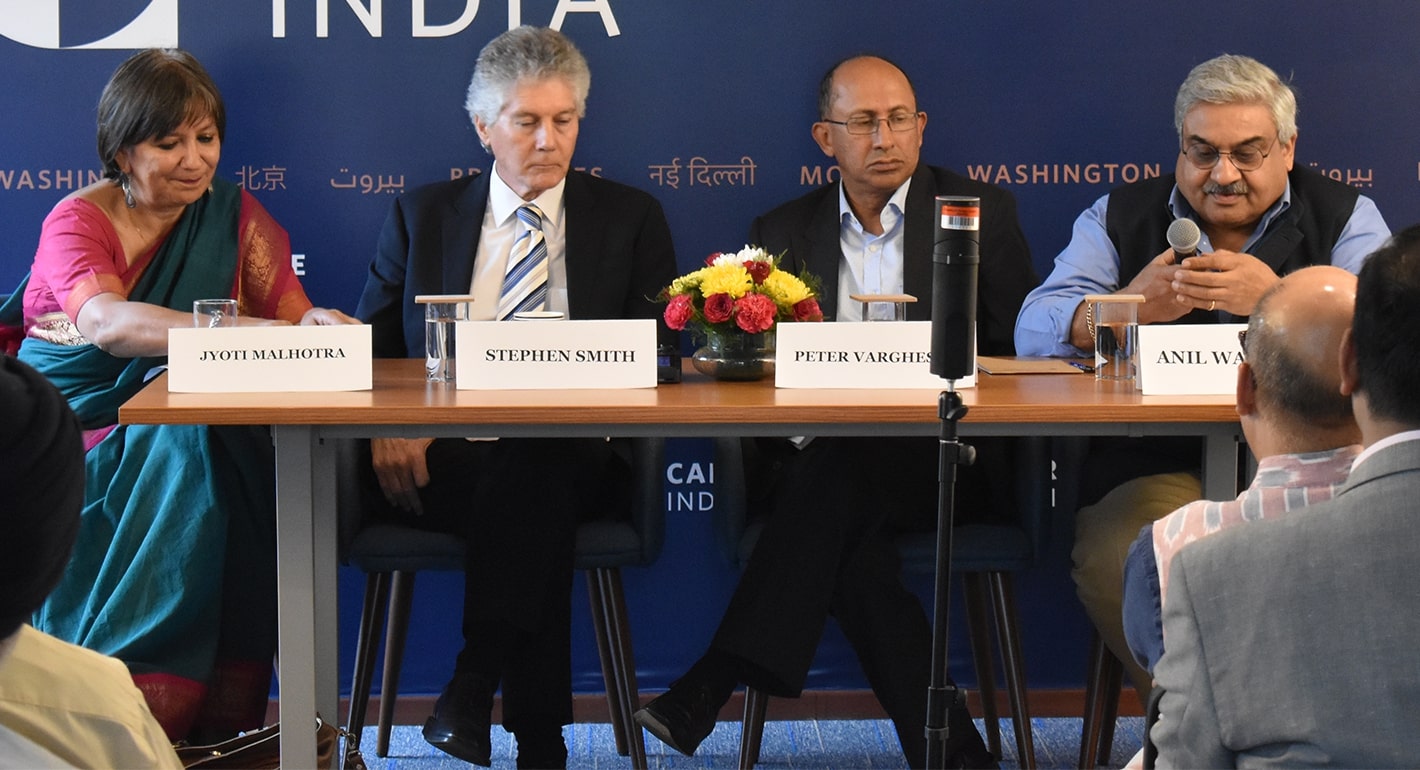Registration
You will receive an email confirming your registration.
The international order is undergoing a transformation as a result of rising geopolitical tensions among major powers, growing challenges to the liberal order, slowdown in the global economy, and rapid technological development. What are India’s and Australia's perspectives on the current international environment? What are their visions for the world order in the years to come?
Carnegie India, in partnership with the Perth USAsia Centre, will host a panel discussion to examine Indian and Australian perspectives on these questions. This will feature former Australian Defense Minister Stephen Smith, former Australian Foreign Secretary Peter Varghese, and Anil Wadhwa, former secretary (East) in the Ministry of External Affairs, India. The discussion will be moderated by Jyoti Malhotra, national and strategic affairs editor at Print.
Discussion Highlights
- Post-war International Order: Participants observed that the post-war US-led international order marked a unique juncture in world history, as the leading power decided that its hard interests were best served by an order that was rules-based. Participants acknowledged that the emphasis on these international rules, along with the open international trading system, benefitted countries such as Australia. As part of this order, global trade had been a key driver of economic growth, they added. However, participants cautioned that the extant order faces considerable strain today. To illustrate, they highlighted the slowing global trade as well as pushback against globalization. They attributed this to the rise of a combination of nativism and populism, which they traced back to the global financial crisis of 2008. Apart from disrupting the financial sector, they noted, this crisis diminished trust in institutions and elites. Simultaneously, participants added that the emergence of disruptive technologies, wielded by large multinational corporations, is also an aspect of globalization that has given rise to concerns. They underscored that to protect critical infrastructure and citizens’ privacy, governments now need to consider the influence of nonstate actors such as corporations. In contrast, they drew attention to how authoritarian states are looking toward emerging technologies, such as artificial intelligence, to consolidate social and political control. Participants also underlined that the growing economic weight of Asia is also contributing to creating new strategic realities.
- U.S.-China Competition: Participants explained that the rise of China, coupled with changes in U.S. policy, has led to realignments in the international order. At the economic level, participants drew attention to the weakening global trading system, with the United States withdrawing from various multilateral treaties and other countries, in turn, pursuing regional arrangements. Further, they noted that U.S. allies face the threat of higher tariffs as well as the fallout from the U.S.-China trade dispute. The latter, they noted, is driven by competition between both nations which spans across the strategic, economic, and technological domains. As another example of the U.S.-China competition, participants cited China’s close relationship with Russia and its investments in Iran, both of which face U.S. sanctions.
- Role of the Indo-Pacific: Participants explained that the growing focus on the Indo-Pacific is a response to China’s rise, particularly the dramatic increase in its naval capability. However, they added, from the Australian perspective, the region’s significance also draws from the rise of other powers, particularly India, which is projected to be the second largest economy by 2050, Indonesia, and ASEAN.
- Converging Interests: Participants drew attention to the tremendous scope for closer economic relations between India and Australia, with potential for trade to increase by a factor of three and investments by a factor of ten. Participants also emphasized both sides’ increasingly converging geostrategic interests, particularly in the Indo-Pacific region. Along with their common interest in protecting the rules-based order in the region, participants highlighted a shared Indo-Australian interest in managing Chinese assertiveness. However, they cautioned against attempting to contain China and suggested a policy framework that engages with China. For this, they underlined the importance of the Quadrilateral group as well as the role of countries such as Indonesia and Vietnam.
This event summary was prepared by Sharanya Rajiv, a senior program coordinator and research assistant at Carnegie India, with inputs from Prateek Jha, a research intern at Carnegie India.
Speakers
Stephen Smith is a professor of public international law at the University of Western Australia. Previously, he was the Australian minister for defense and minister for foreign affairs.
Peter Varghese is the chancellor at the University of Queensland. Previously, he was the secretary of the Australian Department of Foreign Affairs and Trade.
Anil Wadhwa is a distinguished fellow at the Vivekananda International Foundation. Previously, he was secretary (East) in the Ministry of External Affairs, Government of India.
Moderator
Jyoti Malhotra is the national and strategic affairs editor at Print.
